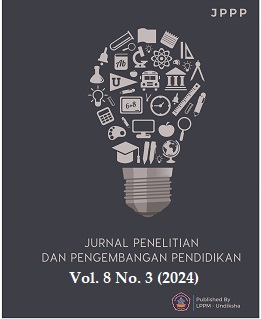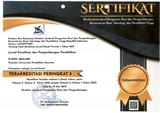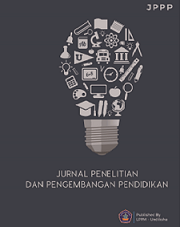Integrated Thematic Learning Design Based on the School Environment to Develop Students' Creative and Critical Thinking
DOI:
https://doi.org/10.23887/jppp.v8i3.61186Keywords:
Models, Learning Design, Critical Thinking, Creative ThinkingAbstract
This research aims to improve teachers' abilities in designing their learning so that it will have an impact on the growth of students' critical and creative thinking abilities. To achieve this goal it is used research type Research and Development (R&D) which consists of a preliminary study; model design and development; and model testing. Data was collected through interviews, literature studies and small-scale surveys. This research involved 4 teachers and 102 elementary school students. The instruments used include questionnaires and test questions. Data analysis techniques use percentage and categorical descriptive analysis. Results The main research shows that implementing this design can effectively develop students' creative and critical thinking abilities. Through a thematic approach that integrates various subjects by utilizing the school environment as a learning resource, students are more actively involved in the learning process. The implications of this research show that applying a contextual learning approach can be an effective strategy in education to develop students' critical and creative thinking abilities.
References
Albertus, H., & Rahayu, T. S. (2020). Penerapan Pendekatan Saintifik Dan Model Team Games Tournament Terhadap Motivasi Belajar Siswa Sekolah Dasar. Jurnal Basicedu, 4(2), 467–475. https://doi.org/10.31004/basicedu.v412.386. DOI: https://doi.org/10.31004/basicedu.v4i2.386
Amalia, F. D., Setiawan, F., & Afiani, K. D. A. (2019). Project Based Learning Sebagai Solusi Melatih Ketrampilan Berpikir Kreatif Siswa Sd Dalam Pembelajaran Ips. Pendas: Jurnal Ilmiah Pendidikan Dasar, 8(1), 4034–4052. https://doi.org/10.23969/jp.v8i1.7126. DOI: https://doi.org/10.23969/jp.v8i1.7126
Amris, F. K., & D. (2019). Pembelajaran Tematik Terpadu Menggunakan Model Problem Based Learning Di Sekolah Dasar. Jurnal Basicedu, 5(4), 2171–2180. https://doi.org/10.31004/basicedu.v514.1170. DOI: https://doi.org/10.31004/basicedu.v5i4.1170
Batubara, D., & S. (2018). Studi Kasus Tentang Kreativitas Guru Pada Pembelajaran Tematik Integratif Di Sd Anak Saleh Malang. Muallimuna: Jurnal Madrasah Ibtidaiyah, 5(1), 47–53. https://doi.org/10.31602/muallimuna.v511.1626. DOI: https://doi.org/10.31602/muallimuna.v4i1.1626
Darmawan, L. A., & Wuryandani, W. (2021). How Picture Storybook Improve Creative Thinking Skills And Learning Outcomes Of Elementary School Students? Journal Of Education Research And Evaluation, 6(3), 529–537. https://doi.org/10.23887/jere.v6i3.45566. DOI: https://doi.org/10.23887/jere.v6i3.45566
Fatchurrohman, F. (2020). Pengembangan Model Pembelajaran Tematik Integratif Eksternal Dan Internal Di Madrasah Ibtidaiyah. Jurnal Iain Salatiga, 2(2), 1–15. https://doi.org/10.18326/infs. DOI: https://doi.org/10.36835/au.v2i1.288
Fauziah, U., & Fitria, Y. (2019). Pengaruh Model Pembelajaran Berbasis Masalah Dan Kemampuan Awal Terhadap Kemampuan Berpikir Kritis Siswa Pada Pembelajaran Tematik Terpadu. Jurnal Basicedu, 6(2), 2836–2845. https://doi.org/10.31004/basicedu.v6i2.2502. DOI: https://doi.org/10.31004/basicedu.v6i2.2502
Fitriani, W., Suwarjo, W., & N, M. (2021). Berpikir Kritis Dan Komputasi: Analisis Kebutuhan Media Pembelajaran Di Sekolah Dasar. Jurnal Pendidikan Sains Indonesia (Indonesian Journal Of Science Education, 9(2), 234–242. https://doi.org/10.24815/jpsi.v9i2.19040. DOI: https://doi.org/10.24815/jpsi.v9i2.19040
Hagi, N. A. M. (2018). Model Problem Based Learning Untuk Meningkatkan Keterampilan Berpikir Kreatif Siswa Sekolah Dasar. Edukatif. Jurnal Ilmu Pendidikan, 3(2), 463–471. https://doi.org/10.31004/edukatif.v312.325. DOI: https://doi.org/10.31004/edukatif.v3i2.325
Handayani, R. H., & Muhammadi, M. (2019). Pengaruh Model Pembelajaran Problem Based Learning Terhadap Hasil Belajar Siswa Dalam Pembelajaran Tematik Terpadu Di Kelas V Sd. E-Jurnal Inovasi Pembelajaran Sekolah Dasar, 9(2), 79–88. https://doi.org/10.24036/e-jipsd.v9i2.9780.
Hasibuan, F. H., Murni, S. M., & Adisaputera, A. (2020). Model Development Integrated Thematic Learning Based On Creative Thinking Stages On Elementary School Education. International Journal Of Educational Research And Social Sciences (Ijersc, 2(4), 696–702. https://doi.org/10.51601/ijersc.v214.112.
Hidayat, T., Mawardi, A., & S. (2020). Peningkatan Kemampuan Berpikir Kritis Dan Hasil Belajar Siswa Kelas Iv Melalui Model Pembelaran Discovery Learning Pada Tema Indahnya Keberagamandi Negeriku. Judika (Jurnal Pendidikan Unsika, 7(1), 1–9. https://doi.org/10.35706/judika.v7i1.1798.
Khasinah. (2020). Model Desain Pembelajaran Tematik Terpadu Kontekstual Untuk Meningkatkan Kebermaknaan Belajar Siswa Sd. Scholaria: Jurnal Pendidikan Dan Kebudayaan, 9(1), 48–61. https://doi.org/10.24246/1-js.2019.v9.11.p48-61. DOI: https://doi.org/10.24246/j.js.2019.v9.i1.p48-61
Khosiah, N., Fadilah, Y., Rizkillah, N. S., & Milla, I. (2020). Model Pembelajaran Tematik Melalui Metode Bercerita Untuk Meningkatkan Berpikir Kritis Siswa Sekolah Dasar. Al-Muaddib: Jurnal Kajian Ilmu Kependidikan, 4(2), 284–298. https://doi.org/10.46773/muaddib.v4i2.461. DOI: https://doi.org/10.46773/muaddib.v4i2.461
Kuncahyono. (2023). Analisis Penerapan Media Berbasis Komputer Pada Pembelajaran Tematik Terpadu Di Sekolah Dasar. Jurnal Pemikiran Dan Pengembangan Sekolah Dasar (Jp2sd, 5(2), 733–780. https://doi.org/10.22219/jp2sd.v5i2.4827. DOI: https://doi.org/10.22219/jp2sd.vol5.no2.773-780
Larasanty, N. K. P. I., & Putra, D. K. N. S. (2021). Peningkatan Kompetensi Pengetahuan Ipa Dengan Menggunakan Model Pembelajaran Predict Observe Explain Berbasis Berpikir Kreatif. Mimbar Ilmu, 25(3), 391–400. https://doi.org/10.23887/mi.v2513.25598.
Melindawati, S. (2016). Pengembangan Bahan Ajar Tematik Terpadu Dengan Model Problem Based Learning Di Kelas Iv Sekolah Dasar. Elementary School Journal Pgsd Fip Unimed, 5(1), 1–12. https://doi.org/10.24114/esjpgsd.v511.3974. DOI: https://doi.org/10.24114/esjpgsd.v5i1.3974
Munawaroh, I. (2020). Pengembangan Model Pembelajaran Tematik Untuk Mengembangkan Keterampilan Berpikir Kritis Siswa Sd Kelas Rendah. Jurnal Penelitian Ilmu Pendidikan, 3(1), 46–60. https://doi.org/10.21831/jpipfip.v0i0.4626.
Nasrul, S. (2021). Pengembangan Bahan Ajar Tematik Terpadu Berbasis Model Problem Based Learning Di Kelas Iv Sekolah Dasar. Jurnal Inovasi Pendidikan Dan Pembelajaran Sekolah Dasar, 2(1), 81–92. https://ejournal.unp.ac.id/index.php/jippsd/article/view/100491. DOI: https://doi.org/10.24036/jippsd.v2i1.100491
Novellia, M., Relmasira, S. C., & Hardini, A. T. A. (2019). Penerapan Model Pembelajaran Problem Based Learning (Pbl) Untuk Peningkatan Kemampuan Berpikir Kreatif Dan Hasil Belajar Siswa Dalam Pembelajaran Tematik. Journal For Lesson And Learning Studies, 1(2), 149–156. https://doi.org/10.23887/ills.v1i2.14760. DOI: https://doi.org/10.23887/jlls.v1i2.14760
Oktari, S. T., Fitria, Y., & Erita, Y. (2020). Penerapan Model Pembelajaran Tematik Terpadu Tipe Connected Untuk Meningkatkan Motivasi Dan Keterampilan Berpikir Kritis Siswa Di Sekolah Dasar. Pendas: Jurnal Ilmiah Pendidikan Dasar, 8(1), 2050–2065. https://doi.org/10.23969/jp.v811.8205. DOI: https://doi.org/10.23969/jp.v8i1.8205
Primayonita, N. K. K., Agustiana, I. G. A. T., & Jayanta, I. N. L. (2020). Model Creativity Learning Meningkatkan Keterampilan Berpikir Kreatif Dan Tanggung Jawab Pada Mata Pelajaran Ipa. Jurnal Pedagogi Dan Pembelajaran, 3(2), 211–222. https://doi.org/10.23887/jp2.v312.26551. DOI: https://doi.org/10.23887/jp2.v3i2.26551
Rahman, M. H., & Latif, S. (2019). Pengembangan Bahan Ajar Tematik Terpadu Berbasis Problem Based Learning Untuk Meningkatkan Kemampuan Berpikir Kritis Siswa Sd Kelas V. Edukasi, 18(2), 246–258. https://doi.org/10.33387/j.edu.v18i2.2100. DOI: https://doi.org/10.33387/j.edu.v18i2.2100
Rizaldi W., ; Mawardi. (2020). Improving Critical Thinking Skills And Learning Outcomes Of 4th Grade Students Through Discovery Learning Model. Journal Of Education, Teaching And Learning, 6(1), 13–17. https://doi.org/10.21832/learntechlib.v6.il. DOI: https://doi.org/10.26737/jetl.v6i1.2348
Sudiana, I. N., & Sukmayasa, I. M. H. (2020). Dampak Model Pembelajaran Pjbl Berbantuan Whatsapp Terhadap Kreativitas Dan Keterampilan Menulis Siswa. Mimbar Ilmu, 26(3), 491–498. https://doi.org/10.23887/mi.v2613.39679. DOI: https://doi.org/10.23887/mi.v26i3.39679
Sukmadinata, N. (2017). Metode Penelitian Pendidikan. Pt Remaja Rosdakarya.
Sumianto, S. Da. A., & I. (2020). Analisis Kreativitas Guru Dalam Merancang Media Pembelajaran Dimasa Pandemi Covid-19. Indonesian Research Journal On Education, 1(2), 71–82. https://doi.org/10.31004/irje.v112.14. DOI: https://doi.org/10.31004/irje.v1i2.14
Sundayana, W. (2019). Readiness And Competence Of Senior High School English Teachers To Implement Curriculum 2013. Indonesian Journal Of Applied Linguistics, 5(1), 29–36. https://doi.org/10.17509/ijal.v511.828. DOI: https://doi.org/10.17509/ijal.v5i1.828
Susilowati, W. (2021). Meta-Analisis Pengaruh Model Inquiry Learning Terhadap Keterampilan Berfikir Kritis Pada Mata Pembelajaran Tematik. Jurnal Ilmiah Pendidikan Profesi Guru, 3(1), 211–216. https://doi.org/10.23887/jippg.v311.28193. DOI: https://doi.org/10.23887/jippg.v3i1.28193
Telembuana. (2020). Kreativitas Guru Dalam Menggunakan Media Pembelajaran Di Sd Negeri 075082 Marafala. Hineni: Jurnal Ilmiah Mahasiswa, 1(1), 10–28. https://doi.org/10.36588/hjim.v111.63. DOI: https://doi.org/10.36588/hjim.v1i1.63
Trnova, E., & Trna, J. (2020). Implementation Of Creativity In Science Teacher Training. International Journal On New Trends In Education And Their Implications, 5(3), 54–63. https://doi.org/10.18508/jnteti.v5i3.p54-63.
Wahyuni, S. S. S. (2020). Pengembangan Dan Pemanfaatan Desain Pembelajaran Tematik Terpadu Berbasis Modeassure Di Sekolah Dasar. Edukatif: Jurnal Ilmu Pendidikan, 2(3), 219–226. https://doi.org/10.31004/edukatif.v213.143. DOI: https://doi.org/10.31004/edukatif.v2i3.143
Widyaningrum, M. D., & Wardani, N. S. (2021). Efektivitas Pembelajaran Tematik (Ps) Terhadap Kemampuan Berpikir Kritis Peserta Didik. International Journal Of Elementary Education, 4(1), 90–99. https://doi.org/10.23887/ijee.v4i1.24385. DOI: https://doi.org/10.23887/ijee.v4i1.24385
Widyaningrum, R. (2021). Model Pembelajaran Tematik Di Mi/Sd. Cendekia: Jurnal Kependidikan Dan Kemasyarakatan, 10(1), 107–120. https://doi.org/10.21154/cendekia.v1011.405. DOI: https://doi.org/10.21154/cendekia.v10i1.405
Zubaidah, S. (2020). Keterampilan Abad Ke-21 Bagaimana Membelajarkan Dan Mengasesnya (Issue https://www.researchgate.net/publication/325809307, pp. 1–26). DOI: https://doi.org/10.36312/e-saintika.v3i2.125
Downloads
Published
How to Cite
Issue
Section
License
Copyright (c) 2024 Mawardi, Agustina Tyas Asri Hardini, Naniek Sulistya Wardani

This work is licensed under a Creative Commons Attribution-ShareAlike 4.0 International License.
Authors who publish with the Jurnal Penelitian dan Pengembangan Pendidikan agree to the following terms:
- Authors retain copyright and grant the journal the right of first publication with the work simultaneously licensed under a Creative Commons Attribution License (CC BY-SA 4.0) that allows others to share the work with an acknowledgment of the work's authorship and initial publication in this journal.
- Authors are able to enter into separate, additional contractual arrangements for the non-exclusive distribution of the journal's published version of the work (e.g., post it to an institutional repository or publish it in a book), with an acknowledgment of its initial publication in this journal.
- Authors are permitted and encouraged to post their work online (e.g., in institutional repositories or on their website) prior to and during the submission process, as it can lead to productive exchanges, as well as earlier and greater citation of published work. (See The Effect of Open Access)








